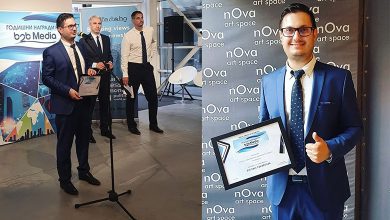
Digital Leader[1], PwC Russia[2], IDC[3], and CROC[4] have conducted joint research to find out which technologies will have the greatest influence on the Russian business sector and job market by 2030. The research indicates that Artificial Intelligence & Machine Learning (AI&ML) will cause the most dramatic changes within Russian companies, followed closely by the Internet of Things (IoT) and Robotic Process Automation (RPA). In 10 years, more than half of employees in Russia will be working remotely. Moreover, 89% of respondents claim that up to 50% of jobs will be replaced by robots and AI, primarily call center agents, salespersons, cashiers, consultants, accountants, drivers, machine operators, and secretaries. However, Russia will need IT specialists, engineers, doctors, bioengineers, geneticists, data analysts, cybersecurity specialists, as well as psychologists and teachers. Most respondents graded Russian business digitalization as ‘satisfactory’.
Digital Leader networking platform, PwC Russia, IDC, and IT company CROC have conducted research to reveal the top technologies for the coming decade that involved 160+ executives and managers from IT and consulting companies, as well as innovation deployment/development and digital transformation business units.
“Together with our partners, we discovered which technologies will change our lives over the next 10 years and how. We only asked the opinion of people whose work directly involves technologies or business digitalization, including top managers of IT market leaders, such as Intel, Pure Storage, and VMware. These experts helped us create a clear vision of the future,” said Alexey Sidorin, Community Manager, Digital Leader.
Respondents graded current Russian business digitalization and innovation development at 3.2 out of 5 stars, claiming that the finance, retail and FMCG, telecom, and mass media and entertainment sectors are most successful in this area.
Research participants were asked to assess various innovation adoption obstacles on a scale of 0 to 5. Inflexible and slow business processes turned out to be the main obstacle to digital transformation both today and over the coming 10 years, being awarded 3.77 and 2.83 stars, respectively.
Lack of digitalization budgets is also hindering this process (3.62 points) and will continue to do so over the coming years (2.76 points). By 2030, regulations will become yet another obstacle to innovation (2.72 points).
Most respondents believe that, over the next 10 years, AI&ML will influence business the most (4.42 out of 5 points), saying that Russia will have an AI tax or license and a marketplace for AI models by 2030.
According to experts, IoT will drive major change within Russian companies (3.96 points). For example, within five years, it will become common to use IoT-based systems for a contactless reading of information on any person you meet at an offline event.
Research participants awarded RPA 3.91 stars as a Russian business influencer, suggesting that robots will be answering 95% of all contact center calls by 2025.
Over the coming 10 years, new technologies will mainly transform IT, marketing, customer support, and accounting departments within Russian companies.
Alexey Okishev, Partner, Head of Technology Practice, PwC Russia, said:
“Research results clearly demonstrate that innovative solutions have not only become an integral part of our lives and business processes but also directly impact our future expectations. Today, given the rapidly changing reality, we can hardly call any 10-year forecast ‘futuristic’. Upon being asked which technology can potentially have the greatest influence on business, the majority of respondents gave the highest score to AI&ML (4.5 out of 5). In addition to rapid evolution, these solutions are also expanding to cover more and more use cases in various sectors, business lines, and even specific tasks. Respondents said that IoT will also have a major influence on the economy, business, and people’s lives, scoring its potential at 3.9 points, a little above RPA.”
One in three respondents believes that the COVID-19 pandemic will give the biggest boost to remote access technologies, although such solutions will remain in demand among businesses, even after the lockdown, as more and more people will be working from home. Therefore, 53% of research participants claim that, by 2030, more than half of employees in Russia will be working remotely.
“In addition, this situation will also foster the spread of AI&ML and VR/AR, which enable the remote performance of multiple tasks. Today, geographically distributed designers and engineers can co-design and approve layouts and drawings in virtual reality, while AR solutions help remotely guide and evaluate factory workers. Moreover, within a few months, the pandemic has already boosted machine learning development, giving rise to multiple technologies that can detect COVID-19 and lung damage based on various parameters and using CT or X-ray,” said Alexey Sidorin.
According to 89% of respondents, by 2030, robots and AI will replace up to 50% of employees and may completely fill some positions, including call center agents, salespersons, cashiers, consultants, accountants, drivers, machine operators, and secretaries.
The most sought-after employees will be IT specialists, engineers, doctors, bioengineers, geneticists, data analysts, cybersecurity specialists, as well as psychologists and teachers.
Robert Farish, IDC Vice President and Managing Director for Russia and the CIS, explained how technology will change the job market:
“Indeed, growing automation and AI adoption will render some professions obsolete. But that’s okay! We will see not only new professions emerge but also a shift in corporate culture and management of organizations, which are becoming more and more digital and geographically distributed. Hierarchical structures will become more flexible, enabling faster decision-making, innovation adoption, and time-to-market for new products, as well as better performance of project teams. We are going to move from traditional KPIs, such as project hours or a number of sales, to key behavioral indicators.”
The expert noted that such behavioral indicators may include managers’ ability to show empathy and build strong relations using emotional intelligence, or employees’ capacity to adapt to tasks that require new skills or perform new ad-hoc functions.
According to respondents, in 10 years, the US and China will still lead digital transformation, followed by other technology influencers: Japan, Singapore, Russia, Europe, the Middle East, Israel, India, South Korea, and Canada.
For more information, please visit the research web-site
[1] International project that unites advanced businesses and digital experts. The Digital Leader networking platform regularly holds events that bring together speakers from large and medium businesses and the scientific community.
[2] PwC Russia provides audit and advisory services, as well as tax and legal services, to customers from different industries. The company has approximately 3,000 employees in Moscow, Saint Petersburg, Ekaterinburg, Kazan, Novosibirsk, Rostov-on-Don, Krasnodar, Voronezh, Vladikavkaz, Nizhny Novgorod, and Perm. ‘PwC’ refers to the PwC network and/or one or more of its member firms, each of which is a separate legal entity. The global network consists of 276,000+ employees across 157 countries. For more information, please visit https://www.pwc.ru/en/about.html
[3] IDC is the premier global provider of market intelligence, advisory services, and events for the information technology, telecommunications, and consumer technology markets. IDC helps IT professionals, business executives, and the investment community make fact-based decisions on purchases and business strategy. More than 1,100 IDC analysts provide global, regional, and local expertise on technology and industry opportunities and trends in 110 countries worldwide. For more than 50 years, IDC has provided strategic insights to help its clients achieve their key business objectives, increase competitive edge, and see new business and sales development opportunities. IDC is a subsidiary of IDG, the world’s leading technology media, research, and events company. IDC Russia and CIS, opened in 1995, releases over 30 researches and holds some 20 events every year. Read more: https://www.idc.com/cis/
[4] CROC is one of the Russian IT market leaders, creating a new digital ecosystem for society, and completing projects in 42 different countries. CROC provides a comprehensive range of IT solutions, including systems integration and managed B2B and consulting services. In addition, CROC also offers off-the-shelf products and promising end-to-end technologies, such as Big Data, blockchain, artificial intelligence, virtual and augmented reality, Internet of Things, robotics, and machine learning.










